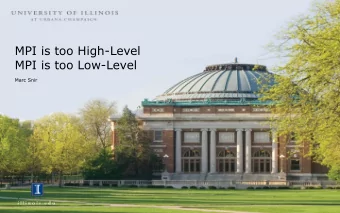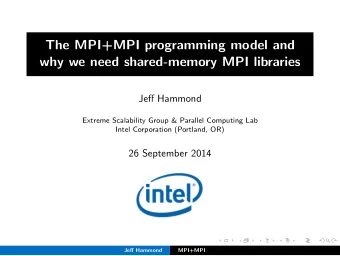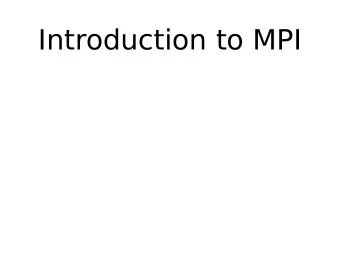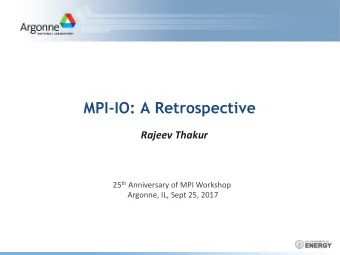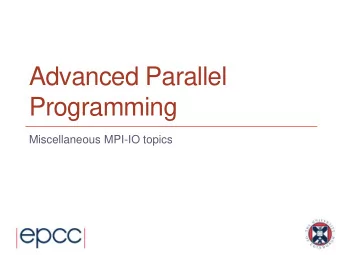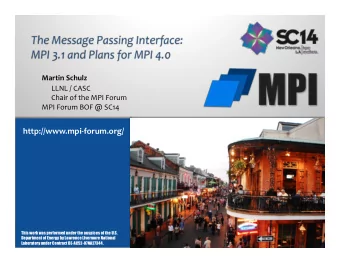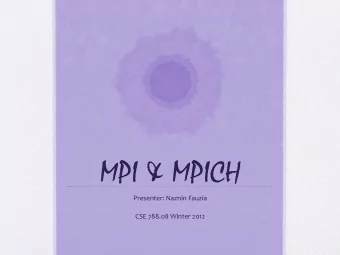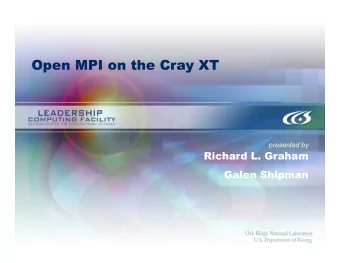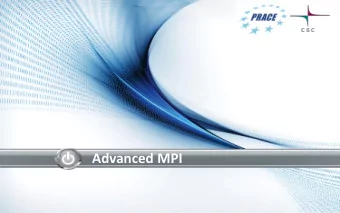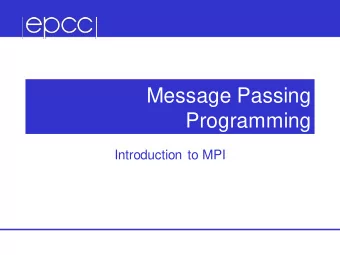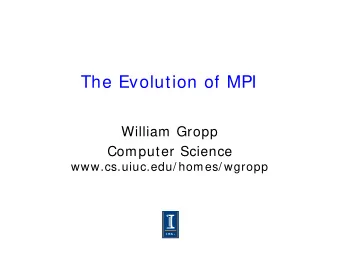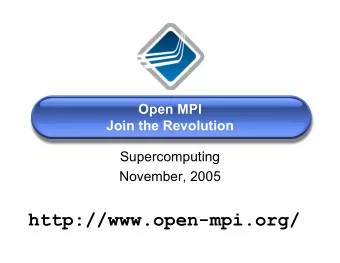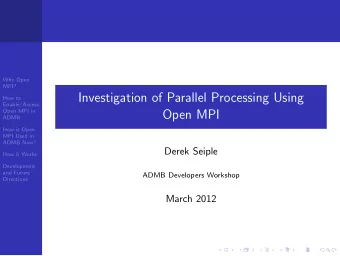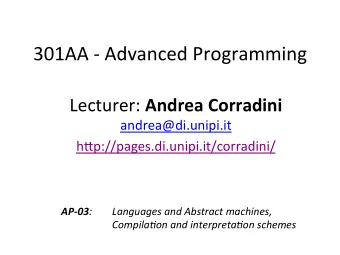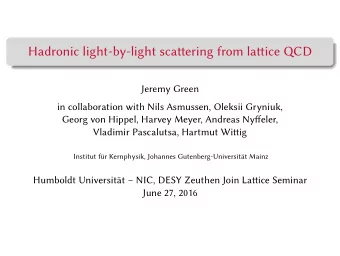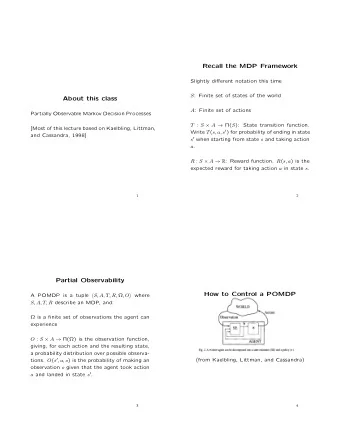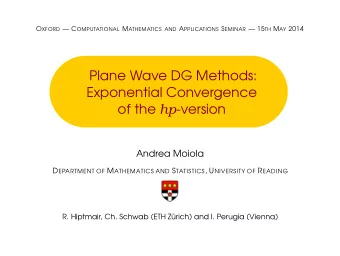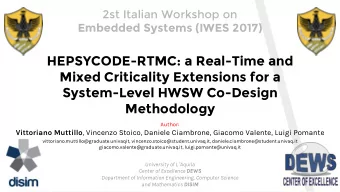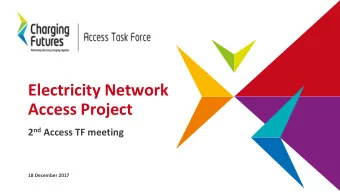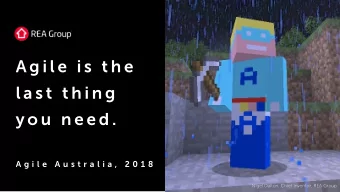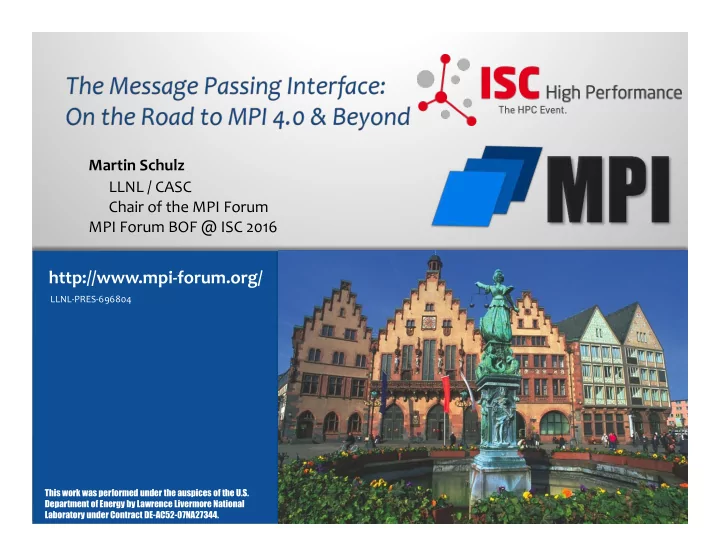
http://www.mpi-forum.org/ LLNL-PRES-696804 This work was performed - PowerPoint PPT Presentation
Martin Schulz LLNL / CASC Chair of the MPI Forum MPI Forum BOF @ ISC 2016 http://www.mpi-forum.org/ LLNL-PRES-696804 This work was performed under the auspices of the U.S. Department of Energy by Lawrence Livermore National Laboratory under
Martin Schulz LLNL / CASC Chair of the MPI Forum MPI Forum BOF @ ISC 2016 http://www.mpi-forum.org/ LLNL-PRES-696804 This work was performed under the auspices of the U.S. Department of Energy by Lawrence Livermore National Laboratory under Contract DE-AC52-07NA27344.
§ MPI 3.0 ratified in September 2012 • Available at http://www.mpi-forum.org/ • Several major additions compared to MPI 2.2 Available through HLRS § MPI 3.1 ratified in June 2015 -> MPI Forum Website • Inclusion for errata (mainly RMA, Fortran, MPI_T) • Minor updates and additions (address arithmetic and non-block. I/O) • Adaption in most MPIs progressing fast The Message Passing Interface: On the Road to MPI 4.0 & Beyond Martin Schulz
§ Non-blocking collectives § Neighborhood collectives § RMA enhancements § Shared memory support § MPI Tool Information Interface § Non-collective communicator creation § Fortran 2008 Bindings § New Datatypes § Large data counts § Matched probe § Nonblocking I/O The Message Passing Interface: On the Road to MPI 4.0 & Beyond Martin Schulz
Status of MPI-3.1 Imp mpleme menta5ons Open Cray Tianhe Intel IBM BG/Q IBM PE IBM SGI Fujitsu MS NEC MPICH MVAPICH MPC MPI MPI MPI MPI MPI 1 MPICH 2 Pla<orm MPI MPI MPI MPI NBC ✔ ✔ ✔ ✔ ✔ ✔ ✔ ✔ ✔ ✔ ✔ (*) ✔ ✔ Nbrhood ✔ ✔ ✔ ✔ ✔ ✔ ✔ ✔ ✘ ✔ ✔ ✘ ✔ ✔ collecKves RMA ✔ ✔ ✔ ✔ ✔ ✔ ✔ ✔ ✘ ✔ ✔ ✘ Q2’17 ✔ Shared ✔ ✔ ✔ ✔ ✔ ✔ ✔ ✔ ✘ ✔ ✔ ✔ * ✔ memory Tools ✔ ✔ ✔ ✔ ✔ ✔ ✔ ✔ ✘ ✔ ✔ * Q4’16 ✔ Interface Comm-creat ✔ ✔ ✔ ✔ ✔ ✔ ✔ ✔ ✔ ✔ * ✔ ✘ ✘ group F08 Bindings ✔ ✔ ✔ ✔ ✔ ✔ ✔ ✘ ✘ ✔ ✘ ✘ Q2’16 ✔ New ✔ ✔ ✔ ✔ ✔ ✔ ✔ ✔ ✘ ✔ ✔ ✔ ✔ ✔ Datatypes Large Counts ✔ ✔ ✔ ✔ ✔ ✔ ✔ ✔ ✘ ✔ ✔ ✔ Q2’16 ✔ Matched ✔ ✔ ✔ ✔ ✔ ✔ ✔ ✔ ✔ ✔ ✔ Q2’16 ✔ ✘ Probe NBC I/O ✔ Q3‘16 ✔ ✔ ✘ ✔ ✘ ✘ ✘ ✔ ✘ ✘ Q4’16 ✔ Release dates are esKmates and are subject to change at any Kme. “ ✘ ” indicates no publicly announced plan to implement/support that feature. Pla<orm-specific restricKons might apply to the supported features 1 Open Source but unsupported 2 No MPI_T variables exposed * Under development (*) Partly done
§ Some of the major initiatives discussed in the MPI Forum • One Sided Communication (William Gropp) • Point to Point Communication (Daniel Holmes) • MPI Sessions (Daniel Holmes) • Hybrid Programming (Pavan Balaji) • Large Counts (Jeff Hammond) • Short updates on activities on tools, persistence and fault tolerance § How to contribute to the MPI Forum? Let’s keep this interactive – Please feel free to ask questions! The Message Passing Interface: On the Road to MPI 4.0 & Beyond Martin Schulz
MPI RMA Update William Gropp www.cs.illinois.edu/~wgropp
Brief Recap: What’s New in MPI-3 RMA • SubstanJal extensions to the MPI-2 RMA interface • New window creaJon rouJnes: – MPI_Win_allocate: MPI allocates the memory associated with the window (instead of the user passing allocated memory) – MPI_Win_create_dynamic: Creates a window without memory aRached. User can dynamically aRach and detach memory to/from the window by calling MPI_Win_aRach and MPI_Win_detach – MPI_Win_allocate_shared: Creates a window of shared memory (within a node) that can be can be accessed simultaneously by direct load/store accesses as well as RMA ops • New atomic read-modify-write operaJons – MPI_Get_accumulate – MPI_Fetch_and_op (simplified version of Get_accumulate) – MPI_Compare_and_swap 7
What’s new in MPI-3 RMA contd. • A new “unified memory model” in addiJon to the exisJng memory model, which is now called “separate memory model” • The user can query (via MPI_Win_get_aRr) whether the implementaJon supports a unified memory model (e.g., on a cache-coherent system), and if so, the memory consistency semanJcs that the user must follow are greatly simplified. • New versions of put, get, and accumulate that return an MPI_Request object (MPI_Rput, MPI_Rget, …) • User can use any of the MPI_Test/Wait funcJons to check for local compleJon, without having to wait unJl the next RMA sync call 8
MPI-3 RMA can be implemented efficiently • “Enabling Highly-Scalable Remote Memory Access Programming with MPI-3 One Sided” by Robert Gerstenberger, Maciej Besta, Torsten Hoefler (SC13 Best Paper Award) • They implemented complete MPI-3 RMA for Cray Gemini (XK5, XE6, XK7) and Aries (XC30) systems on top of lowest-level Cray APIs • Achieved beRer latency, bandwidth, message rate, and applicaJon performance than Cray’s UPC and Cray’s Fortran Coarrays Higher is beRer Lower is beRer 9
MPI RMA is Carefully and Precisely Specified • To work on both cache-coherent and non-cache- coherent systems – Even though there aren’t many non-cache-coherent systems, it is designed with the future in mind • There even exists a formal model for MPI-3 RMA that can be used by tools and compilers for opJmizaJon, verificaJon, etc. – See “Remote Memory Access Programming in MPI-3” by Hoefler, Dinan, Thakur, BarreR, Balaji, Gropp, Underwood. ACM TOPC, Volume 2 Issue 2, July 2015. – hRp://dl.acm.org/citaJon.cfm?doid=2798443.2780584 10
Some Current Issues Being Considered • ClarificaJons to shared memory semanJcs • AddiJonal ways to discover shared memory in exisJng windows • New asserJons for passive target epochs • Nonblocking RMA epochs 11
MPI ASSERTIONS (PART OF THE POINT-TO-POINT WG) Dan Holmes
Assertions as communicator INFO keys • Three separate issues • #52 – remove info key propagation for communicator duplication • #53 – add function MPI_Comm_idup_with_info • #11 – allow INFO keys to specify assertions not just than hints plus define 4 actual INFO key assertions
Remove propagation of INFO • Currently MPI_Comm_dup creates an exact copy of the parent communicator including INFO keys and values • The MPI Standard is not clear on which version of an INFO key/value to propagate • The one passed in by the user or the one used by the MPI library? • If INFO keys can specify assertions then propagating them is a bad idea • Libraries are encouraged to duplicate their input communicator • Libraries expect full functionality, i.e. no assertions • Libraries won’t obey assertions they didn’t set and don’t understand • Removal is backwards incompatible but • Propagation was only introduced in MPI-3.0
Add MPI_Comm_idup_with_info • Non-blocking duplication of a communicator • Rather than blocking like MPI_Comm_idup • Uses the INFO object supplied as an argument • Rather than propagating the INFO from the parent communicator like MPI_Comm_dup_with_info • Needed for purely non-blocking codes, especially libraries
Allow assertions as INFO keys • Language added to mandate that user must comply with INFO keys that restrict user behaviour • Allows MPI to rely on INFO keys and change its behaviour • New optimisations are possible by limiting user demands • MPI can remove support for unneeded features and thereby accelerate the functionality that is needed
New assertions • Four new assertions defined: • mpi_assert_no_any_tag • If set true, MPI_ANY_TAG will not be used • mpi_assert_no_any_source • If set true, MPI_ANY_SOURCE won’t be used • mpi_assert_exact_length • If set true, all sent messages will exactly fit their receive buffers • mpi_assert_allow_overtaking • If set true, messages can overtake even if not logically concurrent
Point-to-point WG • Fortnightly meetings, Monday 11am Central US webex • All welcome! • Future business: • Allocating-receive, freeing-send operations • Further investigation of INFO key ambiguity (Streams/channels has been moved to the Persistence WG)
MPI SESSIONS Dan Holmes
What are sessions? • A simple handle to the MPI library • An isolation mechanism for interactions with MPI • An extra layer of abstraction/indirection • A way for MPI/users to interact with underlying runtimes • Schedulers • Resource managers • An attempt to solve some threading problems in MPI • Thread-safe initialisation by multiple entities (e.g. libraries) • Re-initialisation after finalisation • An attempt to solve some scalability headaches in MPI • Implementing MPI_COMM_WORLD efficiently is hard • An attempt to control the error behaviour of initialisation
How can sessions be used? • Initialise a session MPI_Session • Query available process “sets” • Obtain info about a “set” (optional) Query runtime • Create an MPI_Group directly for set of processes from a “set” • Modify the MPI_Group (optional) MPI_Group • Create an MPI_Communicator directly from the MPI_Group (without a parent communicator) MPI_Comm • Any type, e.g. cartesian or dist_graph
Why are sessions a good idea? • Any thread/library/entity can use MPI whenever it wants • Error handling for sessions is defined and controllable • Initialisation and finalisation become implementation detail • Scalability (inside MPI) should be easier to achieve • Should complement & assist endpoints and fault tolerance
Recommend
More recommend
Explore More Topics
Stay informed with curated content and fresh updates.
